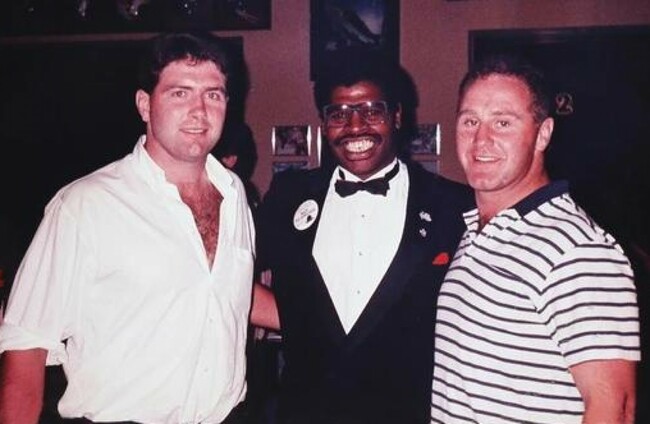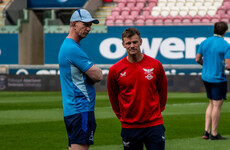1. “It’s a slow summer day in Cornwall in the 1980s and Benjamin Neesham is fiddling with the medium wave dial on his radio in search of some sort of diversion. The airwaves crackle and the room he’s sitting in is suddenly filled with the mellifluous tones of Micheál Ó Muircheartaigh commentating on a hurling match with typical verve. Neesham has no idea what the sport being described even is, but he knows he likes the sound of it. Ó Muircheartaigh’s poetic depiction of the action being regularly punctuated by explosions of noise from an animated crowd made his mind’s eye grow wide with fascination. He found himself rooting for a team with the exotic name of ‘Kilkenny’ that sounded like they were straining every sinew to turn what had seemed certain defeat into an unlikely victory. He didn’t know it then, but Neesham was descending down a rabbit hole that twisted and turned and ultimately opened up a sporting wonderland he has happily inhabited ever since. He might be now living on the Isle of Lewis in the Outer Hebrides off the north coast of Scotland, but Neesham is very much plugged in to all things Kilkenny hurling.”
For GAA.ie John Harrington speaks to Kilkenny hurling’s unlikely supporter
2. “I took this photograph on September 4, 1989. The Irish rugby team was touring North America and we were in Chicago experiencing the candescence of Reagan’s embrace of his country. The handsome devil on the left is Tom Clancy and the winsome beast on the right is Gary Halpin. The man sandwiched in between them died earlier this month. His name is Leon Spinks and he was the only man to beat Muhammad Ali to take his world heavyweight championship away from him. Our chance meeting took place 11 years after his world championship win. Leon Spinks, Gary Halpin and me. It was quite a night.”
The Sunday Independent’s Neil Francis recalls a night out in Chicago with the late boxer Leon Spinks and Gary Halpin, who sadly passed away days after it was published
3. “Just like Ted Cruz, my dad always tried to do right by his kids. We never quite made it to Cancún during an unprecedented world catastrophe, but he did bring as many of us as he could fit in the car to Rosses Point every Easter weekend to watch the West of Ireland golf championship. Dressed like mini-Shackletons, we’d brace the Atlantic tempest and witness shotmaking that would embarrass Herbert Warren Wind.
“As kids, we learned there was the golf we saw on TV, and then there was real golf, played on links courses during infinite winter, quail-high ball flight and knockdown 4 irons travelling 150 yards. We’d take shelter in sparse gorse in between matches. There were sandwiches and leaky flasks of tea. You’d fall asleep on the way home in the car, wind burned and more than a little inspired. Garth McGimpsey, Eamon Brady, Arthur Pierse; artists who would never become household names on PGA tours, but alchemists in their own right, writing subtle verse with bladed irons, a poetry that was consumed by few, but appreciated by all who did.”
Colin Sheridan reflects on his Irish sporting childhood in the Irish Examiner
4. “I am filled with zeal for the Lord God of Hosts.” Well, it doesn’t look like that from here. Feel free to be offended. Your prophet. Your words. The Carmelite Order, present in Irelandsince the second half of the 13th century. In their printed apology following the sentencing of former teacher and rugby coach John McClean for sexually abusing 23 boys from as young as 11-years-old there is a line that reads: “Terenure College and the Carmelite Order failed in their duty to protect them and for this we are truly sorry.”
“I believe the sentiment of Éanna Ó hÓbáin, the Terenure College principal and Michael Troy, the Prior Provincial of the Carmelite Order, is honourable and believe their apology is heartfelt and believe that they are truly and deeply sorry for the devastation caused to the boys and their families directly affected. But overall, I don’t buy it.”
Writing for the Irish Times, Johnny Watterson explains why he does not buy the apology around paedophile John McClean
5. “Luis Suárez had already been made a scapegoat, blamed for all that had gone wrong at Barcelona. He had already been rejected, told bluntly by the club’s new coach, Ronald Koeman, that his services were no longer required. He had been forced to sit alongside the president who had precipitated it all and say thank you for having me, even as the thought of being forced to go brought him to tears. Worse, though, was still to come, a final indignity in his summer of humiliation.
“On Sept. 17, Suárez touched down in the Italian city of Perugia to considerable fanfare. The airport where he landed put out a statement celebrating his arrival. His progress to the city’s University for Foreigners was accompanied by a crowd of fans and photographers. Even the university thanked him for gracing its halls. His stay was to be brief. Suárez was there to sit for an Italian exam. His wife, Sofía Balbi, is of Italian descent, making her husband eligible for citizenship, providing he could demonstrate competency in the language.”
The New York Times’ Rory Smith takes a look at how Luis Suárez rediscovered his bite











What is the point of posting links to articles with pay walls? It’s extremely annoying
@jl: pure laziness